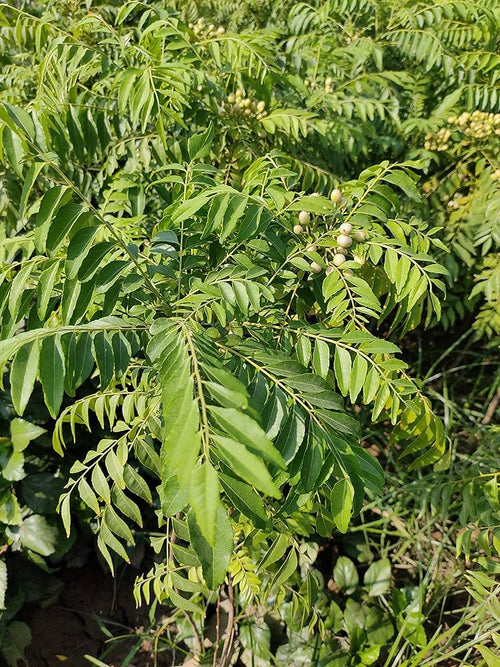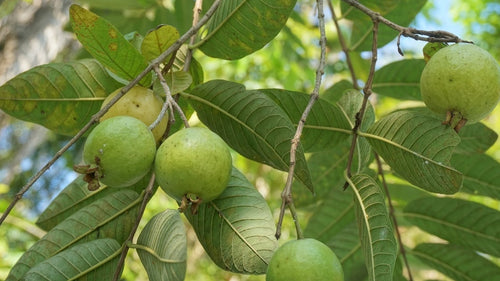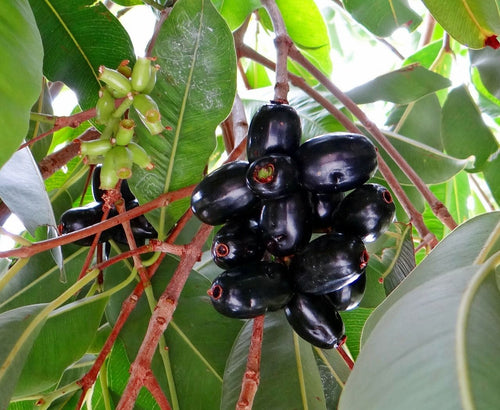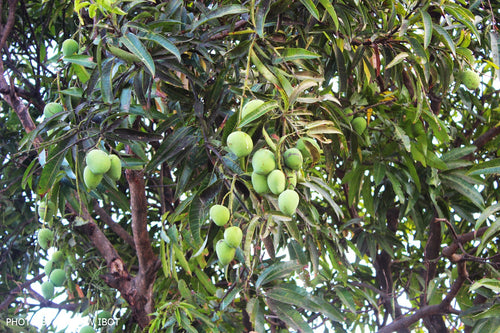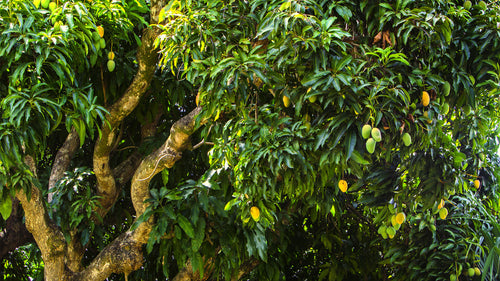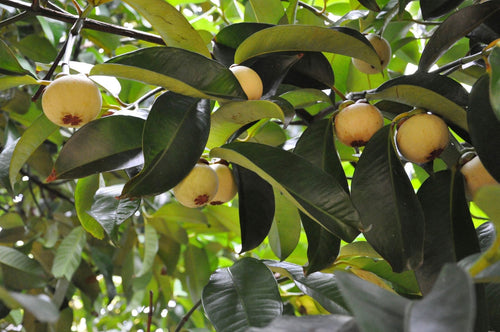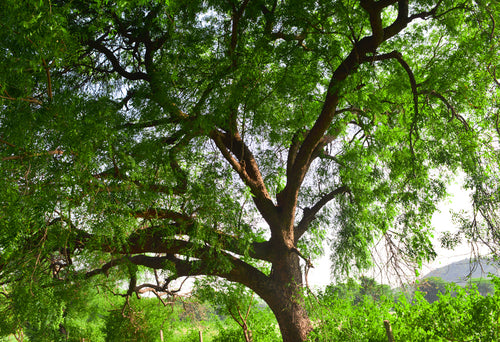"Eco-Engagement: MongoDB’s Urban Forest Tree Planting for a Greener World"
MongoDB's tree plantation initiative focuses on engaging employees in creating vibrant urban forests. This program encourages active participation fro Read more
Project Update 3
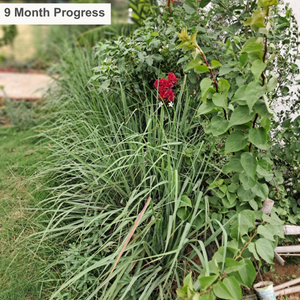
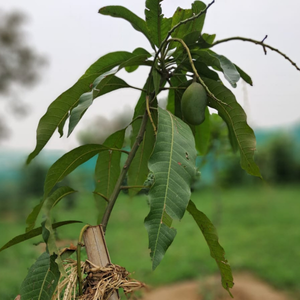
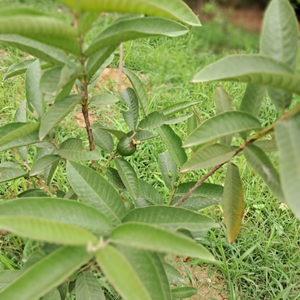
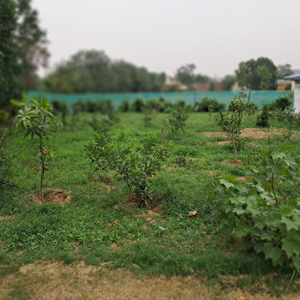
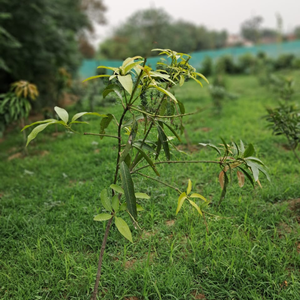
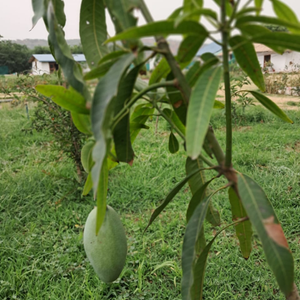
Project Update 2
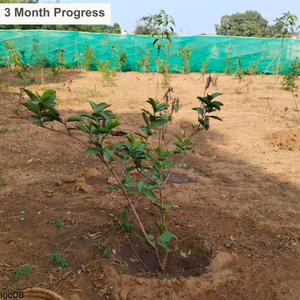
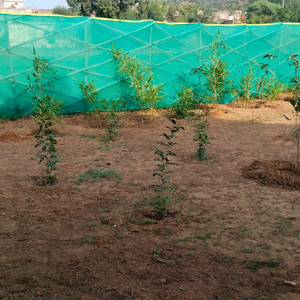
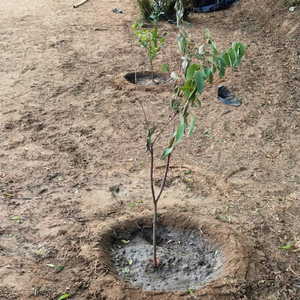
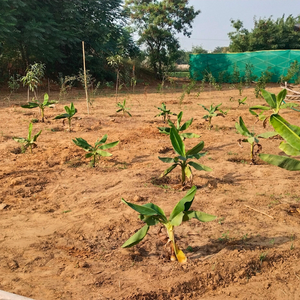

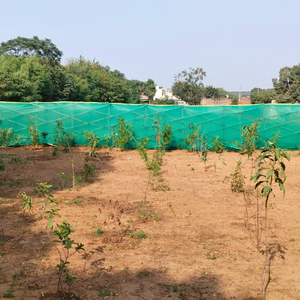
Project Update 1
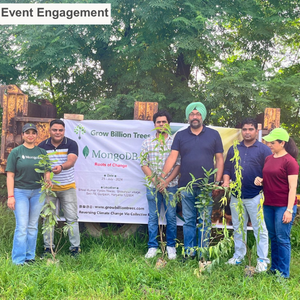
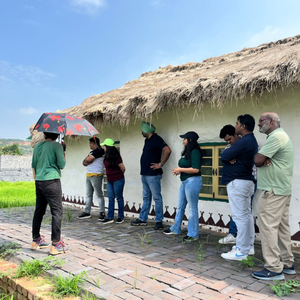
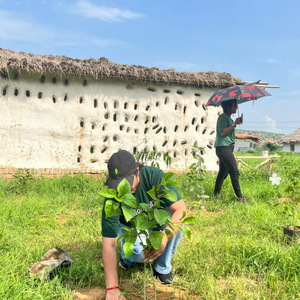
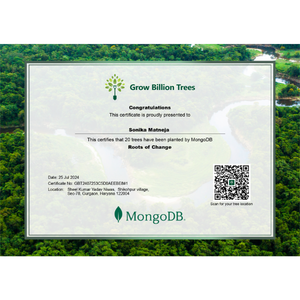
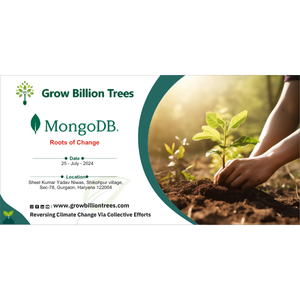
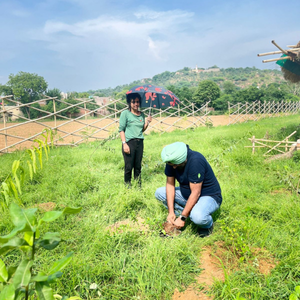
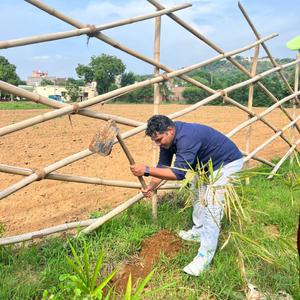
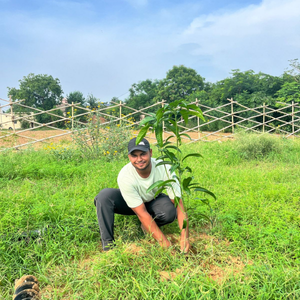
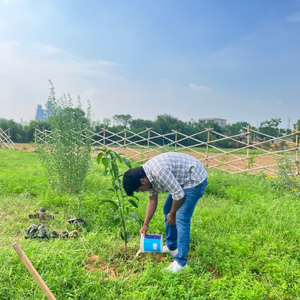
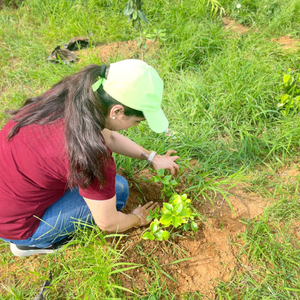
Digital Forest
Forest with 350 Trees planned
Want to plant your tree now?
Plant a Tree @ 299"Eco-Engagement: MongoDB’s Urban Forest Tree Planting for a Greener World"
MongoDB's tree plantation initiative focuses on engaging employees in creating vibrant urban forests. This program encourages active participation from staff, who plant trees in urban areas to enhance green spaces, improve air quality, and promote biodiversity. By involving employees in hands-on sustainability efforts, MongoDB fosters environmental awareness and teamwork while contributing to climate resilience in urban environments. The initiative aligns with MongoDB’s commitment to corporate social responsibility, combining ecological impact with employee engagement for a greener, healthier future.
The event reflected MongoDB's commitment to environmental stewardship and sustainable development. A prominent banner at the site displayed the company’s tagline: “MongoDB – Roots of Change,” capturing the spirit of collective action and responsibility. Employees, volunteers, and local stakeholders actively participated in the plantation, reinforcing the importance of community-driven green initiatives. Through this effort, MongoDB not only contributed to ecological restoration but also raised awareness about the importance of sustainability in everyday practices.
Project Planning & Execution
No of Trees: 350 trees
Plantation Location: Sheel Kumar Yadav Niwas, Shikohpur Village, Sector-78, Gurgaon, Haryana,122004
Plantation Date: 25th July 2024
Name of Species: Mango, Guava, Imali (Tamarind), Madhukamini, Gudahal (Hibiscus), Mehandi, Khirni, Jangal Jalebi, Bamboo, Kaner (Oleander), Chadani, and Jackfruit.
Species Selection & Its Benefits:
MongoDB’s tree plantation initiative carefully selected species well-adapted to the local climate and soil conditions, aiming to enhance ecological balance and provide multiple environmental and social benefits. A total of 350 trees were planted, including Mango, Guava, Imali (Tamarind), Madhukamini, Gudahal (Hibiscus), Mehandi, Khirni, Jangal Jalebi, Bamboo, Kaner (Oleander), Chadani, and Jackfruit.
These species were chosen for their resilience, ecological importance, and cultural significance. Mango and Guava are valuable fruit-bearing trees that provide nutrition, attract pollinators, and support local wildlife. Imali and Madhukamini contribute to soil enrichment and water retention, helping improve soil health and microclimate regulation.
Gudahal and Mehandi are well known for their medicinal properties and ability to enhance the local biodiversity by attracting beneficial insects and birds. Khirni and Jangal Jalebi are native species that contribute to strengthening the ecosystem by supporting various fauna and preventing soil erosion. Bamboo plays a crucial role in stabilising soil, conserving water, and serving as a fast-growing renewable resource.
Kaner and Chadani, apart from adding to the aesthetic value of the plantation, support pollinators and improve air quality by absorbing pollutants. Jackfruit, a large fruit-bearing tree, provides shade, nutrition, and habitat for many species, further enriching the local biodiversity.
Through the integration of these diverse native and resilient species, MongoDB’s plantation not only increases green cover but also improves soil and air quality, conserves water, and strengthens the ecological health of the region. This initiative reflects MongoDB’s commitment to sustainability and its vision of “Together for Sustainability,” fostering a healthier environment for the community and future generations.
Beneficiaries Details
-
Target Population: Employees, stakeholders, and local community members of Sheel Kumar Yadav Niwas, Shikohpur Village
-
Age Group: All age groups focus on adults to seniors
-
Gender: Inclusive of all genders
- Social & Economic Status: Open to all social and economic backgrounds, emphasizing community involvement
Planting Methodology and Its Advantages
Urban Forestry:
An urban forest is a network of trees, shrubs, and vegetation strategically planted in urban areas to enhance biodiversity, improve air quality, reduce the urban heat island effect, and provide green spaces for community well-being. It helps mitigate climate change by absorbing carbon dioxide, promotes mental health through accessible green areas, and supports local wildlife by creating habitats. Urban forests play a vital role in building resilient, sustainable cities that benefit both the environment and the people who live in them. These plantations are essential in offsetting the negative impacts of rapid urbanisation by creating cooler, cleaner, and more sustainable urban environments. With limited space in cities, thoughtful species selection, soil preparation, and ongoing maintenance are crucial for the long-term success of urban plantations.
Advantages of Urban Forestry
-
Climate Regulation and Cooling Effect: Urban forests help mitigate the urban heat island effect by providing shade and cooling through transpiration, lowering temperatures in cities, reducing the need for air conditioning, and conserving energy.
-
Improved Air Quality: Trees absorb pollutants like carbon dioxide, nitrogen oxides, and particulate matter, leading to improved air quality and reducing the risk of respiratory illnesses in urban areas.
-
Stormwater Management and Flood Prevention: Urban forests improve the soil’s ability to absorb and retain water, reducing stormwater runoff, preventing flooding, and promoting groundwater recharge, thus helping manage water resources efficiently.
-
Soil Erosion Control: The deep root systems of trees prevent soil erosion, especially in areas with heavy rainfall or steep slopes, stabilizing the land and reducing soil loss in urban environments.
-
Aesthetic and Recreational Value: The transformation of unused spaces into green zones adds aesthetic value to the area and provides employees and local communities with recreational spaces, making the workplace more enjoyable.
-
Enhanced Community Engagement and Well-being: Urban forests provide accessible green spaces where communities can engage in recreational activities, improving mental health, reducing stress, and fostering a sense of environmental stewardship among residents and employees.
-
Increased Property Value: Properties located near urban forests or green spaces tend to have higher market values, benefiting local property owners and increasing the overall appeal and livability of the area.
-
Noise Reduction: Urban forests act as natural sound barriers, reducing noise pollution and creating quieter, more peaceful surroundings.
Activities During Tree Plantation
The tree plantation drive organised by MongoDB was a vibrant expression of the company’s values of sustainability, environmental stewardship, and community-driven impact. The event saw enthusiastic participation from MongoDB employees, who came together with a shared commitment to contribute meaningfully to environmental restoration.
Preparations for the plantation were conducted meticulously, ensuring that the site and saplings were ready for a successful planting effort. MongoDB employees actively engaged in all key stages of the activity—from digging pits to planting and watering the saplings—making the initiative a truly hands-on and immersive experience. This direct involvement helped participants connect more deeply with the environmental cause and the long-term significance of their contributions.
Beyond the ecological impact, the drive also served as a powerful team-building opportunity. Colleagues collaborated in the open air, shared responsibilities, and strengthened their bond while working toward a common goal. The event concluded with group photos, marking the day with celebration, reflection, and a sense of collective accomplishment.
This initiative was a true embodiment of MongoDB’s belief in “Roots of Change”—a step toward creating lasting environmental transformation through united, purposeful action.
Conclusion Elements
Impact
Direct Impact
|
Parameters |
Values |
References |
|
No. of Trees Planted |
350 |
|
|
Green Cover (Acres) |
0.25 |
|
|
Carbon Sequestration Potential (KG) |
20 |
Small to medium-sized trees can sequester around 10–48 kilograms (22–106 pounds) of CO₂ annually. https://onetreeplanted.org/blogs/stories/how-much-co2-does-tree-absorb |
|
Carbon Sequestration by 350 mature trees ( Tons/year) |
7 Tons |
No. of Trees x Carbon Sequestration by 1 mature tree per year |
|
Carbon Credit Equivalent |
7 |
One carbon credit is equivalent to one tonne of carbon dioxide or the equivalent amount of another greenhouse gas. |
|
Carbon Footprint of an avg Indian Citizen (Tons/Year) |
1.8 |
|
|
Offsets Annual Carbon Footprint of (Adults) |
4 |
Carbon offset by 350 mature trees per year / Carbon Footprint of an avg Indian Citizen per year |
* This impact analysis is forward-looking (An urban-forest project matures in 3-5 years)
Indirect Impact
Community Impact
-
Improved Public Health: By improving air quality and reducing urban heat, the project indirectly contributes to better public health. The presence of green spaces encourages outdoor activities, which can reduce stress levels, promote mental well-being, and decrease the incidence of respiratory diseases.
-
Environmental Awareness: Involving communities in urban forestry raises awareness about environmental conservation and promotes sustainable practices in daily life.
-
Employee Morale: The initiative fostered a sense of pride and connection among employees, strengthening team bonds and their alignment with the company’s values.
-
Inspiration for Change: By showcasing the potential of urban forestry, the project has encouraged other organisations and local communities to undertake similar initiatives.
-
Cultural Shift: The initiative instilled a mindset of sustainability and environmental care among participants, creating advocates for green practices in their personal and professional lives.
Environmental Impact
-
Carbon Sequestration: The trees planted through MongoDB's urban forestry initiative absorb carbon dioxide, acting as carbon sinks and helping mitigate climate change by reducing greenhouse gas emissions.
-
Soil Health Improvement: The tree planting initiative enhances soil health by enriching it with organic matter, improving soil fertility and structure, which supports the growth of surrounding vegetation.
-
Erosion Prevention: Tree roots help stabilise the soil in urban areas, preventing erosion caused by wind and water, while safeguarding nearby properties and infrastructure from potential damage.
-
Biodiversity Conservation: By creating green spaces, the initiative supports local biodiversity, providing habitats for various species, pollinators, and beneficial insects, and enhancing the ecological balance in urban areas.
-
Water Cycle Regulation: The urban forestry project helps regulate the water cycle by improving water retention in the soil, recharging groundwater levels, and reducing surface runoff, leading to a more balanced and sustainable urban environment.
-
Microclimate Regulation: Trees planted through this initiative moderate temperature extremes, reduce wind speeds, and increase humidity, creating a favourable microclimate for both the community and the urban ecosystem.
Achievements
SDG Goals Achieved through Urban Forestry
-
SDG 3: Good Health and Well-Being: MongoDB’s urban forestry initiative improves air quality and introduces green spaces that support physical and mental well-being. These natural environments help reduce stress, encourage outdoor activity, and foster healthier lifestyles in urban settings.
-
SDG 6: Clean Water and Sanitation: Through tree planting, MongoDB promotes water conservation by aiding groundwater recharge, reducing runoff, and enhancing soil moisture retention, contributing to sustainable urban water systems.
-
SDG 7: Affordable and Clean Energy: By reducing the urban heat island effect, the plantation helps moderate city temperatures and decrease dependence on energy-intensive cooling systems, thus promoting energy efficiency and sustainability.
-
SDG 8: Decent Work and Economic Growth: The initiative creates green jobs in nursery management, plantation, and ecosystem maintenance, supporting local livelihoods and advancing the green economy.
-
SDG 9: Industry, Innovation, and Infrastructure: MongoDB incorporates sustainable green practices into urban infrastructure, showcasing innovative approaches that integrate technology with environmental resilience.
-
SDG 10: Reduced Inequalities: The initiative is inclusive, involving employees from all backgrounds in environmental action. By developing accessible green zones, MongoDB ensures shared environmental and health benefits across communities.
-
SDG 11: Sustainable Cities and Communities: By increasing green cover and enhancing biodiversity in dense urban areas, MongoDB contributes to building sustainable, resilient, and livable cities.
-
SDG 12: Responsible Consumption and Production: MongoDB’s eco-initiatives reflect a commitment to sustainable practices, emphasising efficient use of resources and long-term ecological responsibility.
-
SDG 13: Climate Action: The planted trees help sequester carbon dioxide, reduce emissions, and buffer against climate change impacts, actively supporting global climate goals.
-
SDG 15: Life on Land: By restoring green spaces with native and fruit-bearing trees, the initiative strengthens biodiversity, supports wildlife, and contributes to a thriving urban ecosystem.
-
SDG 16: Peace, Justice, and Strong Institutions: By fostering inclusive decision-making and community-led governance, MongoDB strengthens local environmental stewardship, ensuring transparency and collaboration for sustainable urban development.
-
SDG 17: Partnerships for the Goals: The initiative thrives on collaboration with local communities, environmental organisations, and partners such as Grow Billion Trees. MongoDB strengthens environmental partnerships to drive impactful urban sustainability and afforestation efforts. future.
ESG Achieved through Urban Forestry
-
Environmental Impact: MongoDB’s urban forestry initiative makes a meaningful contribution to environmental sustainability. By planting a diverse mix of native and beneficial tree species, the company enhances local biodiversity, supports pollinators and wildlife, and strengthens urban ecosystems. These trees act as natural carbon sinks, helping to reduce atmospheric CO₂ levels and combat climate change. Additionally, the plantation improves climate resilience by regulating ambient temperatures, reducing the urban heat island effect, improving air quality, and increasing groundwater recharge. This forward-looking effort supports long-term ecological balance and a healthier environment for future generations.
-
Social Impact: MongoDB’s urban forestry initiative fosters social responsibility and community well-being by involving employees and local stakeholders in environmental stewardship. Through active participation in tree planting and awareness efforts, the initiative cultivates a deeper connection with nature and promotes collective action for sustainability. The creation of green spaces improves air quality, encourages outdoor activity, and contributes to better mental and physical health. Additionally, the project supports green jobs through sapling plantations and ongoing maintenance. By promoting inclusivity and ensuring access to cleaner, greener environments for all communities, including underserved groups, this initiative helps build a more resilient, equitable, and environmentally conscious society.
-
Governance Impact: MongoDB showcases strong environmental leadership and responsible governance through its urban forestry initiative. By integrating sustainability into its core CSR strategy, the company promotes transparency and accountability in project planning, execution, and reporting. Collaborating with environmental organisations and local communities, MongoDB ensures that its afforestation efforts are inclusive, impactful, and aligned with broader ecological goals. This governance approach not only supports environmental and social outcomes but also reflects the company’s long-term vision for sustainable growth and ethical corporate responsibility.
Building Communities
One of the most impactful outcomes of MongoDB’s urban forestry initiative was the sense of unity and collaboration it cultivated. By involving employees, local communities, and volunteers, the project became a collective mission to create sustainable urban green spaces, fostering a shared commitment to a greener future.
-
Empowering Communities: Participants became active contributors, gaining knowledge about urban forestry practices and taking ownership of the initiative. This empowerment strengthened their connection to the environment and reinforced their role as environmental stewards.
-
Fostering Partnerships: The project brought together diverse stakeholders, including MongoDB, Grow Billion Trees, and local communities, highlighting the value of collaboration in achieving environmental and social goals.
-
Creating a Ripple Effect: As communities experienced the benefits of urban forestry, their enthusiasm inspired others to adopt similar practices, amplifying the initiative's positive impact across the region.
This initiative demonstrates that environmental sustainability thrives when rooted in collective effort. It’s not just about planting trees—it’s about planting hope, collaboration, and a shared vision for a healthier and greener future.
Commitment by Grow Billion Trees
-
Ensuring Tree Survivability: GBT prioritises native species, continuous monitoring, and soil health improvement using organic fertilisers. These efforts ensure sustainable growth and benefit communities.
-
Transparency & Accountability: GBT provides detailed reports on tree growth, survival rates, and carbon benefits, using geo-fencing and regular updates to maintain transparency and effectiveness.
-
Sustainable Plantation Efforts: GBT implements projects that balance environmental, social, and economic goals, addressing issues like urban heat islands and degraded farmlands. These efforts promote ecological balance, livelihoods, and long-term climate resilience.
-
Enhancing Ecosystem Health: By selecting native species and creating diverse habitats, GBT enhances biodiversity and ecosystem resilience, ensuring long-term ecological health and supporting wildlife.
-
Long-Term Impact: GBT’s initiatives tackle environmental challenges, foster climate resilience, and promote sustainable development while reducing carbon footprints.
Acknowledgment
We at Grow Billion Trees extend our heartfelt gratitude to everyone who contributed to the success of the tree plantation initiative at Sheel Kumar Yadav Niwas, Shikohpur Village, Gurgaon. This initiative serves as a testament to the power of collective action in addressing environmental challenges, particularly in rapidly urbanising regions where green spaces are under increasing threat. The success of this plantation drive was made possible by the dedication, collaboration, and enthusiastic participation of MongoDB employees, local partners, and the surrounding community.
To MongoDB: We sincerely thank you for your steadfast commitment to sustainability and your proactive leadership in championing environmental responsibility. Your support in planting 350 diverse, native, and climate-resilient trees has significantly contributed to improving air quality, restoring biodiversity, and promoting ecological stability in the region. The enthusiastic involvement of your team, from planning and preparation to planting and nurturing saplings, reflects MongoDB’s deep-rooted environmental values and culture of corporate responsibility.
Your guiding principle, “Roots Of Change,” was reflected in every aspect of this initiative. We are proud to have partnered with MongoDB in creating a greener and healthier future, and we look forward to continued collaboration to amplify our shared impact on the environment.
To Our Ground Partners and Volunteers: Your dedication and on-ground expertise played a vital role in executing this initiative with precision and care. Your efforts ensured that each tree was thoughtfully selected and planted to maximise ecological benefits and community value. Your collaboration continues to drive real change in creating sustainable, healthy, and biodiverse urban environments.
Thank you all for your continued support and commitment to growing a better, greener future—one tree at a time.
Closing Remarks
The tree plantation initiative by MongoDB at Sheel Kumar Yadav Niwas, Shikohpur Village, Gurgaon, marks a vital step toward ecological restoration and sustainable urban development. By planting 350 native and climate-resilient trees, the project not only enhances local biodiversity and air quality but also fosters a deeper connection between people and the planet.
MongoDB’s active involvement highlights how forward-thinking organisations can drive environmental impact and community well-being through meaningful, on-ground action. This initiative serves as a living expression of MongoDB’s commitment to building a greener future, true to its guiding belief: “Roots of Change.”
As these trees take root, they symbolise the beginning of a long-term environmental transformation. Grow Billion Trees is proud to have partnered with MongoDB on this journey and remains dedicated to nurturing these green assets for years to come. Together, we are planting not just trees, but the very roots of change for future generations.
Trees for Corporates
Trending
Most Popular
1. MongoDB’s Urban Green Revolution
MongoDB is diving into the world of urban forestry, turning cities green one sapling at a time! Their Urban Green Revolution isn’t just about planting trees; it’s about building mini-forests in the midst of concrete. Employees eagerly swap screens for saplings, getting their hands dirty to restore nature in urban spaces. This initiative not only enhances biodiversity but also improves air quality and mental well-being. Think of it as MongoDB’s way of coding cleaner air and greener surroundings. Through this green revolution, MongoDB is making a lasting environmental impact—because tech and trees are better together.
2. Employee Engagement Through Urban Forestry
At MongoDB, employee engagement is as lively as a young forest! Their urban forestry projects bring teams together for hands-on green action. Employees step away from the digital world and into the realm of nature, planting saplings and seeing their direct impact. This eco-activity strengthens camaraderie, boosts morale, and provides a refreshing change of pace. It’s team building on a whole new level, with a side of climate action. MongoDB proves that when it comes to engagement, nothing beats working together to make the world a little greener.
3. Sustainable Tech Meets Nature at MongoDB
MongoDB’s approach to sustainability combines high-tech solutions with the green power of trees. By creating urban forests, they’re setting an example of how technology companies can lead in environmental responsibility. Each tree planted is like a ‘patch’ in the real world, tackling issues from air pollution to climate resilience. MongoDB’s efforts show that sustainable tech goes beyond efficient coding—it’s also about ensuring a sustainable planet. This initiative highlights the brand’s commitment to an eco-friendly future, where nature and innovation grow hand in hand.
4. Biodiversity Boost with MongoDB Urban Forests
MongoDB’s urban forest projects aren’t just about adding greenery; they’re designed to boost biodiversity. By planting native species, MongoDB creates habitats for local birds, insects, and other urban wildlife, giving biodiversity a much-needed boost. This thoughtful planting approach also teaches employees about local ecosystems and the importance of balance in nature. It’s a living lesson in ecology right outside their windows! MongoDB’s urban forests show that preserving biodiversity isn’t just for national parks—it’s something that can flourish even in the heart of the city.
5. Climate Action Through Tree Planting
Climate action is a phrase everyone’s heard, but MongoDB makes it tangible. Their urban forest initiative tackles climate change in real-time, with trees acting as carbon sinks in bustling urban areas. Each sapling absorbs CO₂, lowers temperatures, and provides cleaner air for all. MongoDB is planting the seeds of climate resilience, one forest at a time, proving that even tech giants can make a big difference in the battle against global warming. In the grand scheme of climate action, every tree counts, and MongoDB’s urban forests are contributing to a cooler, greener planet.
6. MongoDB’s Green Thumb Approach to Corporate Responsibility
Corporate responsibility gets a green twist with MongoDB’s commitment to urban forests. By planting trees, MongoDB is taking corporate social responsibility (CSR) to new heights (literally!). The initiative serves as an example of how companies can give back to their communities while championing the environment. It’s not just about profits; it’s about leaving a positive, lasting impact. MongoDB’s green thumb approach to CSR makes environmental care part of the brand’s DNA, showing that business and environmental responsibility go hand-in-hand.
7. Urban Forests
What if tech companies could design cityscapes to be lush, green, and eco-friendly? MongoDB is making that vision a reality with their urban forest blueprint. They’re transforming urban areas into vibrant green spaces that breathe life into the city. These mini-forests provide shade, absorb noise, and add a splash of tranquility to busy environments. By actively creating greener cities, MongoDB is setting an example for urban development that prioritizes both people and the planet. It’s urban planning at its finest—where nature and innovation unite.
8. Connecting People and Nature with MongoDB
In the tech world, it’s easy to lose touch with nature, but MongoDB’s urban forest initiative reconnects people with the planet. Employees join forces to plant trees, get their hands dirty, and feel the real-world impact of their efforts. This connection to nature isn’t just refreshing; it’s inspiring. MongoDB’s initiative reminds everyone that no matter how digital the world gets, our roots (literally!) are in nature. This is more than just planting trees; it’s a reminder of the importance of nurturing and respecting our natural world.
FAQ
What is the goal of MongoDB’s tree plantation initiative?
MongoDB’s tree plantation initiative aims to enhance urban forests while promoting employee engagement and environmental sustainability. By involving employees in hands-on tree planting activities, we strive to create green spaces that improve air quality, support biodiversity, and contribute to climate change mitigation in urban areas.
How does MongoDB engage employees in the tree planting initiative?
MongoDB encourages employee engagement by organizing tree planting events where employees can actively participate in planting and caring for trees. These activities foster teamwork, provide a sense of purpose, and promote awareness of environmental issues, reinforcing our commitment to corporate social responsibility.
What types of trees are planted in MongoDB's urban forests?
In our urban forests, MongoDB focuses on planting native tree species that are well-suited to the local climate and soil conditions. These trees are selected for their ability to thrive in urban environments, support local wildlife, and enhance the ecosystem, contributing to the overall health of our urban areas.
How does tree planting benefit the urban environment?
Tree planting in urban areas provides numerous benefits, including improved air quality, reduced urban heat, and enhanced aesthetic appeal. Trees help absorb pollutants, provide shade, and create habitats for wildlife, making cities more livable and environmentally friendly while also promoting community well-being.
What role do urban forests play in climate change mitigation?
Urban forests are essential in combating climate change as they sequester carbon dioxide, reducing greenhouse gas emissions. By planting trees, MongoDB contributes to climate resilience, helping to cool cities and manage stormwater, thus enhancing the overall sustainability of urban environments.
How does MongoDB measure the success of its tree plantation initiative?
MongoDB measures the success of its tree plantation initiative through various metrics, such as the number of trees planted, employee participation rates, and environmental impact assessments. We regularly monitor tree growth and health to ensure that our urban forests thrive and contribute effectively to sustainability goals.
Are there educational components in MongoDB's tree plantation initiative?
Yes, MongoDB incorporates educational components into its tree plantation initiative. We organize workshops and awareness campaigns that educate employees and the community about the importance of trees, biodiversity, and sustainable practices, fostering a culture of environmental stewardship.
How does MongoDB collaborate with local communities for tree planting?
MongoDB actively collaborates with local communities, NGOs, and government organizations to enhance the impact of our tree planting efforts. By partnering with these groups, we ensure that our initiatives are aligned with community needs and environmental goals, fostering a collective commitment to sustainability.
Can individuals participate in MongoDB's tree plantation events?
While our primary focus is on employee engagement, we often welcome community members and local organizations to participate in tree planting events. We believe that collective efforts lead to greater environmental impact, and we encourage individuals to join us in our mission to create greener urban spaces.
What is the long-term vision for MongoDB’s tree plantation initiative?
MongoDB’s long-term vision for our tree plantation initiative is to establish a network of thriving urban forests that enhance biodiversity, improve air quality, and create sustainable green spaces in cities. We aim to inspire other organizations to adopt similar initiatives, fostering a collaborative approach to environmental stewardship.
- Choosing a selection results in a full page refresh.
- Opens in a new window.



